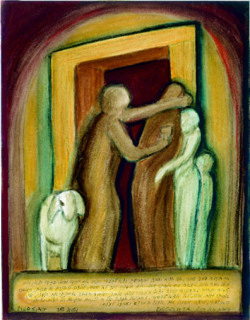
TO DO
Laws Concerning Hebrew slavebondsman or Slave = עבד Hebrew male slaves or servants had the option to leave after six years and also in the year of Jubilee. Unlike male and female slaves from the nations who were to be slaves for life. The Law of Moses contained a set of rules for the Hebrew people to follow about how they were to treat another Hebrew person if they were male or female or a child and another set of rules about every one else not from the twelve tribes of Israel. If you saw a adult male with a hole in his ear you knew he was a slave or bondservant for life. That hole was made with a awl. All land returned to the original owner in the year of Jubilee. There were many others rules or laws that were found in the Law of Moses to guide and protect the children of Israel from other unscrupulous members in the twelve tribes of Israel. |
לעשות – דרוש תרגום
חוקי העבד העבריbondsman or Slave = עבד לעבד זכר עברי היתה אפשרות לעזוב לאחר שש שנים, או בשנת היובל. תורת משה הכילה חוקים עבור העם העברי לעקוב על הדרך הם התייחסו לאדם עברי אחר בין אם הם זכר או נקבה או ילד, קבוצת כללים אחרת התייחסה לכל אחד אחר לא מתוך שנים עשר שבטי ישראל. אם ראית אדם בוגר עם חור באזנו, ידעת שהיה עבד או משרת לכל חייו. החור באוזן נעשה בעזרת מרצע. בשנת היובל כל הקרקעות מוחזרות לבעליהן המקוריים. הרבה חוקים אחרים נקבעו על-ידי חוקת משה כדי להגן על ילדי ישראל מאנשים חסרי מצפון משנים עשר שבטי ישראל. |
Background reading:Laws Concerning Hebrew slave“Now these are the ordinances which you shall set before them. When you buy a Hebrew slave, he shall serve six years, and in the seventh he shall go out free, for nothing. If he comes in single, he shall go out single; if he comes in married, then his wife shall go out with him. If his master gives him a wife and she bears him sons or daughters, the wife and her children shall be her master’s and he shall go out alone. But if the slave plainly says, `I love my master, my wife, and my children; I will not go out free,’ then his master shall bring him to God, and he shall bring him to the door or the doorpost; and his master |
קריאת רקע:חוקי העבד העבריוְאֵלֶּה, הַמִּשְׁפָּטִים, אֲשֶׁר תָּשִׂים, לִפְנֵיהֶם. |
:מודולים אחרים ביחידה זו
- Moshe, Exodus 3:1-2 – משה – שְׁמוֹת ג, א-ב
- Eved, Exodus 21:1-6 – עבד – שְׁמוֹת כא, א-ז
- Daughters of Zelophehad, Numbers 27:1-7 – בְּמִדְבַּר כז, א-ח
- Shvuia, Deuteronomy 21:10-14 – דְּבָרִים כא, י-יד
- Auva, Deuteronomy 21:15-17 – דְּבָרִים כא, טו-יז
- Rahab, Joshua 2:18 – רחב – יְהוֹשֻׁעַ ב, יח
- Crossing the Jordan River, Joshua 3:17 – יְהוֹשֻׁעַ ג, יז, עוברים את נהר הירדן
- Barak & Deborah, Judges 4:8-9 – שׁוֹפְטִים ד, ח-ט, ברק, דבורה
- Yael, Judges 4:21 – שׁוֹפְטִים ד, כא, יעל
- Gideon, Judges 7:5-6 – גדעון, שׁוֹפְטִים ז, ה-ו
- Jotham, Judges 9:8-15 – שׁוֹפְטִים ז, ח-טו, הָעֵצִים
- Ruth and Boaz at the Threshing Floor, Ruth 3:1-18 – רות ובועז בגורן רות, רות ג:א-יח
- Shof’tim 11:34 or Jephthah, Judges 11:34 – יפתח הגלעדי עם בתו היחידה, שׁוֹפְטִים יא, לד
- Samson and Delilah – new ropes, Judges 16:11-12 – שׁוֹפְטִים טז, יא-יב, שמשון ודלילה – חבלים חדשים
- Shimshon, Shof’tim 16:18 or Samson, Judges 16:18
- Samson, Judges 16:19 – שׁוֹפְטִים טז, יט, שמשון
- Levite and his Concubine, Judges 19:25-27 – לוי ופילגשו, שׁוֹפְטִים יט, כד-כז
- Daughters of Shiloh, Judges 21:20-21 – בְנוֹת שִׁילוֹ שׁוֹפְטִים כא, כ-כא
- Abigail had to act quickly, 1Samuel 25:18-24 – אביגיל פעלה מהר שְׁמוּאֵל א כה, יז-כד
- David and Bathsheba, 2 Samuel 11:2-5 – שְׁמוּ אֵל ב יא, ב-ה – דוד ובת שבע
- Kerem or vineyard, 1 Kings 21:7 – כרם – מְלָכִים א כא, ז